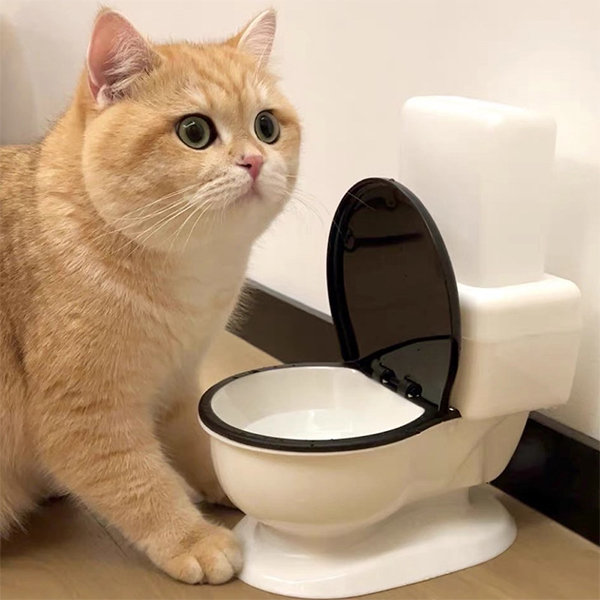Avoid Toilet Disasters: Don't Flush Cat Poop Down Your Toilet - Expert Guidance
Avoid Toilet Disasters: Don't Flush Cat Poop Down Your Toilet - Expert Guidance
Blog Article
We have noticed the article about Don’t flush cat feces down the toilet listed below on the web and felt it made perfect sense to write about it with you on this site.

Intro
As feline owners, it's necessary to be mindful of how we deal with our feline buddies' waste. While it might appear practical to flush pet cat poop down the toilet, this technique can have harmful effects for both the atmosphere and human wellness.
Ecological Impact
Flushing cat poop introduces unsafe pathogens and bloodsuckers right into the water, positioning a significant risk to marine environments. These impurities can adversely influence aquatic life and concession water top quality.
Wellness Risks
In addition to environmental issues, purging pet cat waste can also posture health and wellness risks to human beings. Feline feces may have Toxoplasma gondii, a parasite that can cause toxoplasmosis-- a potentially severe ailment, specifically for pregnant women and individuals with damaged body immune systems.
Alternatives to Flushing
Fortunately, there are much safer and much more liable means to dispose of cat poop. Take into consideration the following choices:
1. Scoop and Dispose in Trash
The most common method of getting rid of feline poop is to scoop it into an eco-friendly bag and throw it in the garbage. Make sure to use a devoted clutter scoop and deal with the waste promptly.
2. Usage Biodegradable Litter
Choose eco-friendly cat trash made from products such as corn or wheat. These clutters are environmentally friendly and can be safely dealt with in the trash.
3. Bury in the Yard
If you have a yard, take into consideration hiding pet cat waste in a marked location away from vegetable yards and water resources. Make sure to dig deep sufficient to stop contamination of groundwater.
4. Set Up a Pet Waste Disposal System
Invest in an animal waste disposal system especially developed for pet cat waste. These systems use enzymes to break down the waste, reducing odor and environmental influence.
Final thought
Responsible pet dog ownership expands past offering food and shelter-- it also includes appropriate waste monitoring. By refraining from purging pet cat poop down the bathroom and selecting alternate disposal techniques, we can decrease our ecological footprint and protect human health.
Why You Should Never Flush Cat Poop Down the Toilet
A rose by any other name might smell as sweet, but not all poop is created equal. Toilets, and our sewage systems, are designed for human excrement, not animal waste. It might seem like it couldn’t hurt to toss cat feces into the loo, but it’s not a good idea to flush cat poop in the toilet.
First and foremost, assuming your cat uses a litter box, any waste is going to have litter on it. And even the smallest amount of litter can wreak havoc on plumbing.
Over time, small amounts build up, filling up your septic system. Most litter sold today is clumping; it is made from a type of clay that hardens when it gets wet. Ever tried to scrape old clumps from the bottom of a litter box? You know just how cement-hard it can get!
Now imagine just a small clump of that stuck in your pipes. A simple de-clogger like Drano isn’t going to cut it. And that means it’s going to cost you big time to fix it.
Parasitic Contamination
Believe it or not, your healthy kitty may be harboring a nasty parasite. Only cats excrete Toxoplasma in their feces. Yet it rarely causes serious health issues in the cats that are infected. Most people will be fine too if infected. Only pregnant women and people with compromised immune systems are at risk. (If you’ve ever heard how women who are expecting are excused from litter cleaning duty, Toxoplasma is why.)
But other animals may have a problem if infected with the parasite. And human water treatment systems aren’t designed to handle it. As a result, the systems don’t remove the parasite before discharging wastewater into local waterways. Fish, shellfish, and other marine life — otters in particular — are susceptible to toxoplasma. If exposed, most will end up with brain damage and many will die.
Depending on the species of fish, they may end up on someone’s fish hook and, ultimately on someone’s dinner plate. If that someone has a chronic illness, they’re at risk.
Skip the Toilet Training
We know there are folks out there who like to toilet train their cats. And we give them props, it takes a lot of work. But thanks to the toxoplasma, it’s not a good idea.

I came across that blog entry on Don’t flush cat feces down the toilet while doing research the web. Are you aware of anybody else who is in the market for How to Dispose of Cat Poop and Litter Without Plastic Bags? Why not promote it. Thanks for taking the time to read it.
Explore Report this page